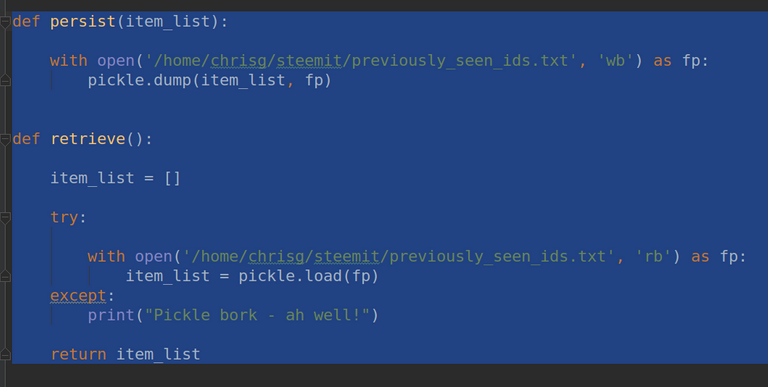
Back when I was learning C and C++, I often reused a piece of code that would write data from memory to a file and read it back again to persist state.
Just dump my struct to a file.
Any time the software needed to restart - say after a system crash - it could just keep on trugging along as if not much had happened :)
It is a very long time since I coded in C++ (outside of Arduino and C#) but that concept stuck with me.
I had no idea there was a similar functionality in Python until today (yes, I am late to the party!)
Introducing Pickle
Now if this is not news to you I do not blame you for rolling your eyes, but if you haven't seen Pickle then you are in for a treat.
Start with, as you would expect, importing pickle.
Then use the following code to persist and recall your data:
def persist(item_list):
with open('my_list.txt', 'wb') as fp:
pickle.dump(item_list, fp)
Supply this function with your array/list.
And then to get it back ...
def retrieve():
item_list = []
try:
with open('my_list.txt', 'rb') as fp:
item_list = pickle.load(fp)
except:
print("Pickle bork - ah well!")
return item_list
So what happens is your array or list goes from memory to a file on your file system, and then you can reverse the process :)
Obviously the file needs to exist, so just use the shell command as follows:
touch my_list.txt
(this will create a placeholder file ready for your script to run)
Neat, eh?
Pickle is great. I find it most useful when I am dealing with a lot of manually-entered data and an unstable script I wrote off-the-cuff. If I'm an idiot and break something, as long as I keep pickling it to disk as I go, I can just sort of pick it up where I left off.
It’s a really good feature when you are in a pickle and need to get your data back.
Thanks I will be here all week.
Beginner question:
Shouldn't this command create a file if it is not existing already?
Yes but in most cases your scripts will attempt to read first so touching the file is just a precaution, obviously you can check for file existence in your code too and even prepare it with an empty array :)
.
Ooh, nice! Thank you :)
Friend had not noticed that Pickle option, which is efficient. Thanks for the input, Greetings ;))
Pickle is highly useful! I'm not sure if I've used it to restore a whole state though. I only really remember using it with big data.
I am using it to check for IDs of records to see if I have seen them before, doesn't sound like a big deal but it saved me some migraines ;)
Thank you for introducing this very useful tool. I may use this to save some unstructured data or model.
What this configuration, from your coding?